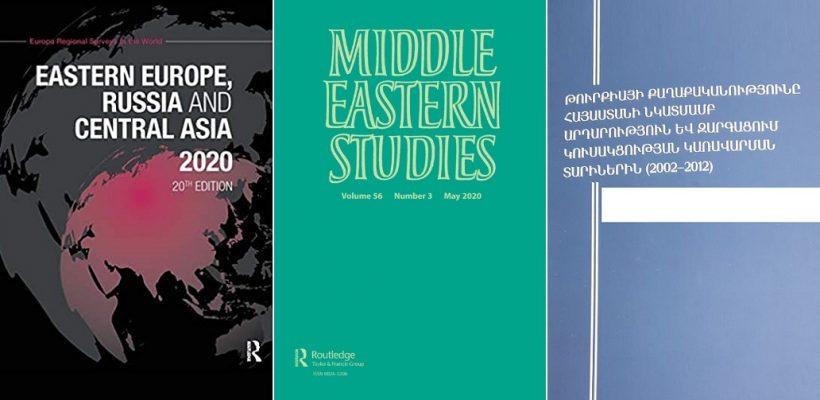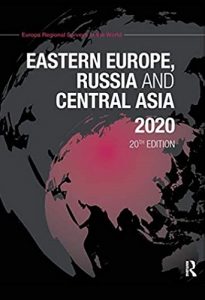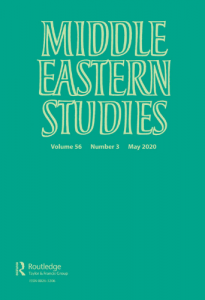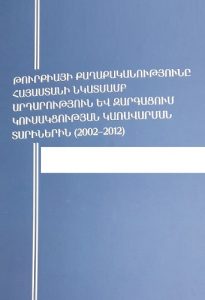
New Publications by PSIA Program Chair
3 min readThe American University of Armenia (AUA) is pleased to inform that Dr. Vahram Ter-Matevosyan, associate professor and chair of AUA’s Political Science and International Affairs (PSIA) program, has recently published three research pieces.
 In January, Dr. Ter-Matevosyan’s research titled “History of Armenia: Country Survey” was published in the 20th edition of the book Eastern Europe, Russia and Central Asia 2020, released by Routledge, a leading academic publisher in the humanities and social sciences. The chapter examines the turning points in Armenian history starting from the 1960s up to 2019. It starts with exploring the road Armenia undertook to regain independence from the Union of Soviet Socialist Republics (USSR) and the impact of the Soviet Armenian dissident groups and underground movements leading to the rise of the Karabakh movement. The study also looks into the last decade of the Soviet Union, its collapse, and the unfolding of the Karabakh conflict. The presidencies of Levon Ter-Petrosyan, Robert Kocharyan, and Serzh Sargsyan are also covered. The study also examines the adoption of the constitutional amendments in December 2015 and the ensuing political instability. Subsequently, it discusses the failed transformation of power in April 2018, the change of government through public protests, and the steps that the new government has undertaken since May 2018. The article concludes with an analysis of the aftermath of the 2018 legislative elections.
In January, Dr. Ter-Matevosyan’s research titled “History of Armenia: Country Survey” was published in the 20th edition of the book Eastern Europe, Russia and Central Asia 2020, released by Routledge, a leading academic publisher in the humanities and social sciences. The chapter examines the turning points in Armenian history starting from the 1960s up to 2019. It starts with exploring the road Armenia undertook to regain independence from the Union of Soviet Socialist Republics (USSR) and the impact of the Soviet Armenian dissident groups and underground movements leading to the rise of the Karabakh movement. The study also looks into the last decade of the Soviet Union, its collapse, and the unfolding of the Karabakh conflict. The presidencies of Levon Ter-Petrosyan, Robert Kocharyan, and Serzh Sargsyan are also covered. The study also examines the adoption of the constitutional amendments in December 2015 and the ensuing political instability. Subsequently, it discusses the failed transformation of power in April 2018, the change of government through public protests, and the steps that the new government has undertaken since May 2018. The article concludes with an analysis of the aftermath of the 2018 legislative elections.
 Dr. Ter-Matevosyan, together with Dr. Ruben Melkonyan, dean of the Faculty of Oriental Studies at Yerevan State University (YSU), published a research article in Middle Eastern Studies, a renowned peer-reviewed academic journal that has been covering the modern Middle East since 1964. The article, titled “Stranded in Geopolitics: The Question of Turkish Armenians in Soviet-Turkish Relations,” analyzes Russian, Turkish, and Armenian sources. It presents hitherto unexplored features of the policy proposed by the Soviet Union on encouraging Turkish Armenians to migrate to Soviet Armenia in the initial years of the Cold War. The article argues that the shifting dynamics of Soviet-Turkish relations during the Second World War influenced the Soviet leadership to transfer Turkish Armenians to the Soviet Union with two objectives in mind: exploiting the implications of the geopolitical rift and making Turkish Armenians its new citizens. The first part of the article deals with different migration and displacement trends of Turkish Armenians in the interwar period. The second part discusses various traces of geopolitical zigzagging during the Second World War, and how they came to shape the Soviet government’s policy towards Turkish Armenians.
Dr. Ter-Matevosyan, together with Dr. Ruben Melkonyan, dean of the Faculty of Oriental Studies at Yerevan State University (YSU), published a research article in Middle Eastern Studies, a renowned peer-reviewed academic journal that has been covering the modern Middle East since 1964. The article, titled “Stranded in Geopolitics: The Question of Turkish Armenians in Soviet-Turkish Relations,” analyzes Russian, Turkish, and Armenian sources. It presents hitherto unexplored features of the policy proposed by the Soviet Union on encouraging Turkish Armenians to migrate to Soviet Armenia in the initial years of the Cold War. The article argues that the shifting dynamics of Soviet-Turkish relations during the Second World War influenced the Soviet leadership to transfer Turkish Armenians to the Soviet Union with two objectives in mind: exploiting the implications of the geopolitical rift and making Turkish Armenians its new citizens. The first part of the article deals with different migration and displacement trends of Turkish Armenians in the interwar period. The second part discusses various traces of geopolitical zigzagging during the Second World War, and how they came to shape the Soviet government’s policy towards Turkish Armenians.
 The third research that Dr. Ter-Matevosyan recently published is a collective monograph on Turkish Foreign Policy and Armenian-Turkish Relations. The book was co-authored by Dr. Ruben Safrastyan, AUA General Education adjunct lecturer and director of the Institute of Oriental Studies, and Anush Hovhannisyan and Tatevik Manukyan from the Institute of Oriental Studies. It is titled “The Policy of Turkey Towards Armenia During the Governing Period of the Justice and Development Party (2002-2012)”. It focuses mainly on the Justice and Development Party’s policy toward Armenia in the period 2002-2012. The book also discusses the evolution of the foreign policy principles of the Justice and Development Party, the institutional stakeholders, Turkey’s foreign policy-making, and power politics in different power corridors in Turkey. In addition, the book contains interviews conducted with the political and intellectual elite of Turkey on Armenian-Turkish relations during Dr. Ter-Matevosyan’s fieldwork in Turkey in 2012.
The third research that Dr. Ter-Matevosyan recently published is a collective monograph on Turkish Foreign Policy and Armenian-Turkish Relations. The book was co-authored by Dr. Ruben Safrastyan, AUA General Education adjunct lecturer and director of the Institute of Oriental Studies, and Anush Hovhannisyan and Tatevik Manukyan from the Institute of Oriental Studies. It is titled “The Policy of Turkey Towards Armenia During the Governing Period of the Justice and Development Party (2002-2012)”. It focuses mainly on the Justice and Development Party’s policy toward Armenia in the period 2002-2012. The book also discusses the evolution of the foreign policy principles of the Justice and Development Party, the institutional stakeholders, Turkey’s foreign policy-making, and power politics in different power corridors in Turkey. In addition, the book contains interviews conducted with the political and intellectual elite of Turkey on Armenian-Turkish relations during Dr. Ter-Matevosyan’s fieldwork in Turkey in 2012.
Dr. Ter-Matevosyan’s earlier book, Turkey, Kemalism, and the Soviet Union: Problems of Modernization, Ideology and Interpretation, was recently reviewed in Ab Imperio, a journal of the Association for Slavic, East European, and Eurasian Studies.
The Political Science and International Affairs (PSIA) program of the American University of Armenia (AUA) equips students with advanced analytical reasoning, critical thinking, and communication skills through the study of political science and international affairs, emphasizing local and global perspectives and practical applications of theory. The program provides world-class teaching and research, producing graduates who can best contribute to the development of the nation.
